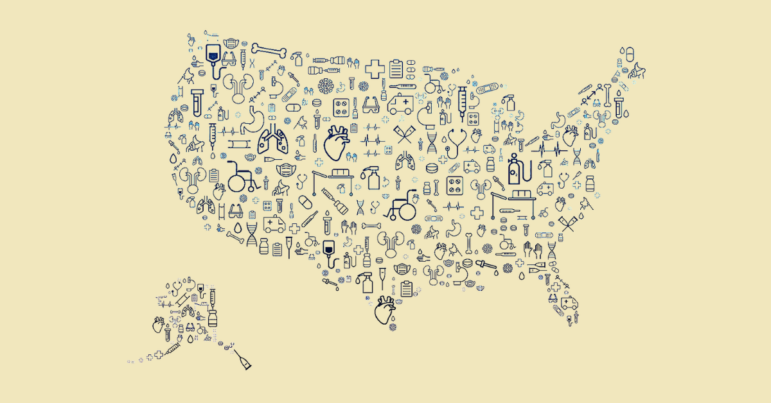Medical debt has become an epidemic in the United States, amounting to an estimated $220 billion, with 8.6% of American adults owing at least $250 in medical debt in recent years. While medical debt affects patients all over the country, people in certain states appear to be more susceptible to medical debt than others.
Based on a KFF analysis aggregating Survey of Income and Program Participation (SIPP) data from 2019 through 2021, the states with the lowest proportions of adults with at least $250 of of medical debt are Hawaii (2.3%), the District of Columbia (2.7%), California (3.9%), Massachusetts (5.1%), Rhode Island (5.2%), and Oregon (5.2%).
We identified some common themes in these states’ policies using data from the Medical Debt Policy Scorecard and the Commonwealth Fund, which may contribute to their low shares of medical debt.
Medicaid expansion
All of these leading states have expanded Medicaid eligibility to 133% of the Federal Poverty Level (FPL) with funding from the Affordable Care Act (ACA). Research has shown that Medicaid expansion has improved financial well-being and significantly reduced the amount of medical debt sent to collections.
In addition, California retroactively extends benefits and protections to patients who become eligible for insurance, Medicaid/Medicare, or charity care after incurring debt. They’ve also expanded access to Medicaid for undocumented immigrants who are income-eligible. Similarly, Hawaii has introduced a Health Care Premium Assistance Program. This special state program combines federal health insurance tax credits with state financial assistance to ensure that low income residents that are not U.S citizens and who do not qualify for Medicaid don’t have to pay monthly health plan bills. Participants in the Premium Assistance Program are responsible for their own deductibles and copays; the program only covers the cost of monthly premiums or bills from their health plan.
Limit surprise billing and debt collection actions
Most of these top states require healthcare providers to provide accurate, itemized bills that detail the amount billed, the amount received from insurance and/or the patient, an explanation of charges, available discounts or charity care policies, and whether any discounts have been applied.According to the Medical Debt Policy Scorecard Massachusetts mandates that hospitals and other healthcare providers offer a reasonable payment plan before sending a bill to collections. Both California and Massachusetts restrict or prohibit sending a bill to collections or credit reporting while the patient is appealing to insurance, applying for financial assistance, negotiating the bill, in a payment plan, or seeking coverage for necessary care. And California requires providers to establish procedures for billing disputes, such as appeals for denials of charity care, surprise billing disputes, and situations where a patient can’t afford the billed amount.
In most states, hospitals and debt buyers can sue patients to collect on unpaid medical bills. However, Massachusetts prohibits sending bills to collections for certain low-income patients. All top states except Rhode Island have restrictions on executing actions like garnishing wages or initiating home foreclosure.
Surpass Federal Financial Aid Standards
Federal law requires nonprofit hospitals to establish and publicize a written financial assistance policy, but these standards lack any minimum eligibility requirements and leave out for-profit hospitals. California, DC, Oregon, and Rhode Island require hospitals to provide financial assistance and set certain minimum standards that exceed the federal standard. Massachusetts and Oregon mandate screening of patients for insurance eligibility and financial assistance eligibility.
Navigating Healthcare Affordability
Continued policy interventions are necessary to confront the persistent challenge of healthcare affordability in the United States. Several states are embracing the trend of forgiving debt for residents who meet designated debt thresholds and Federal Poverty Guidelines (FPG) requirements through collaborations with third-party debt purchasers like Undue Medical Debt. Future patient protections could enhance access to financial assistance, ensure that nonprofit hospitals earn their tax exemptions, and curb aggressive billing and collections practices.
